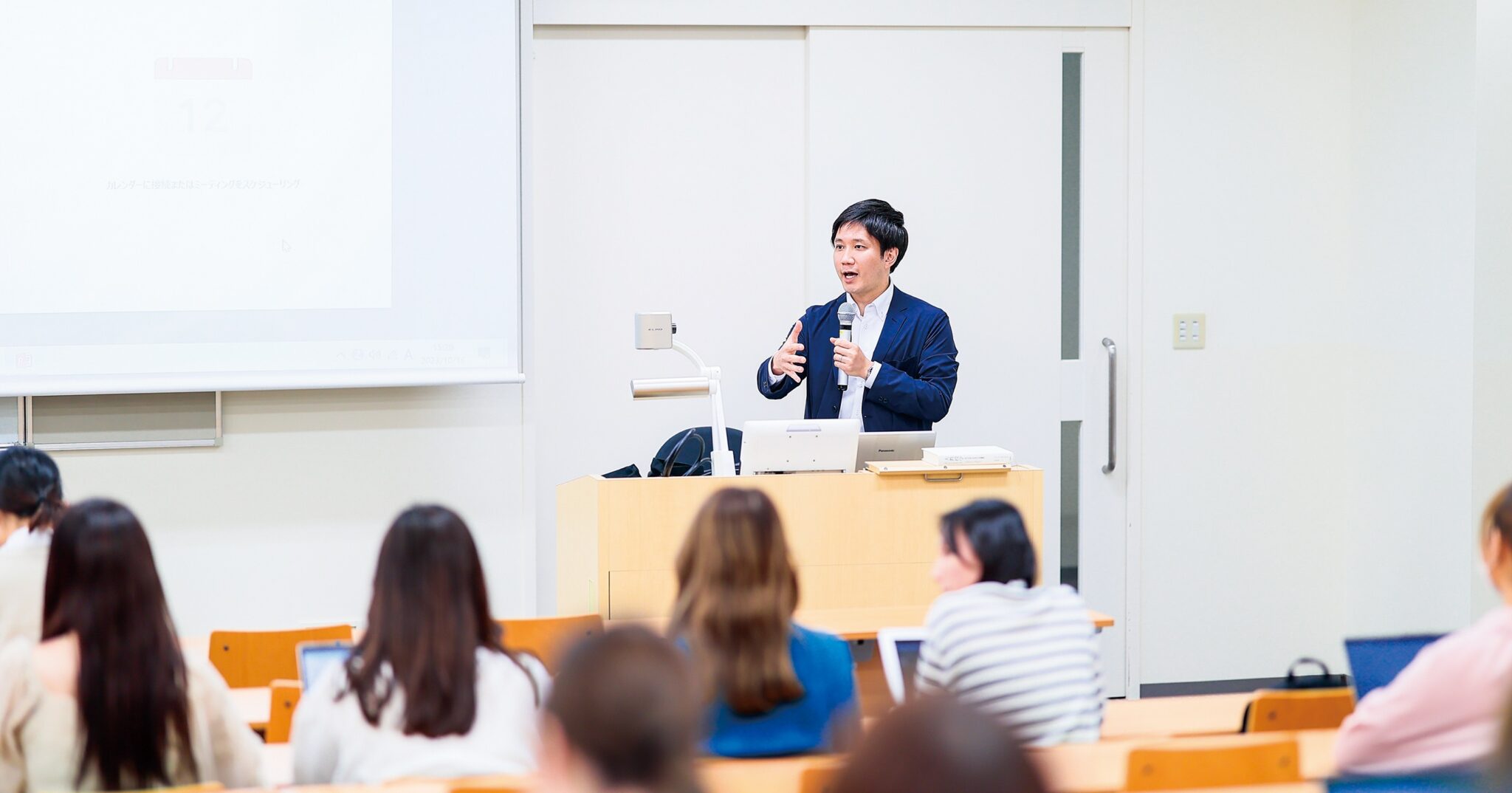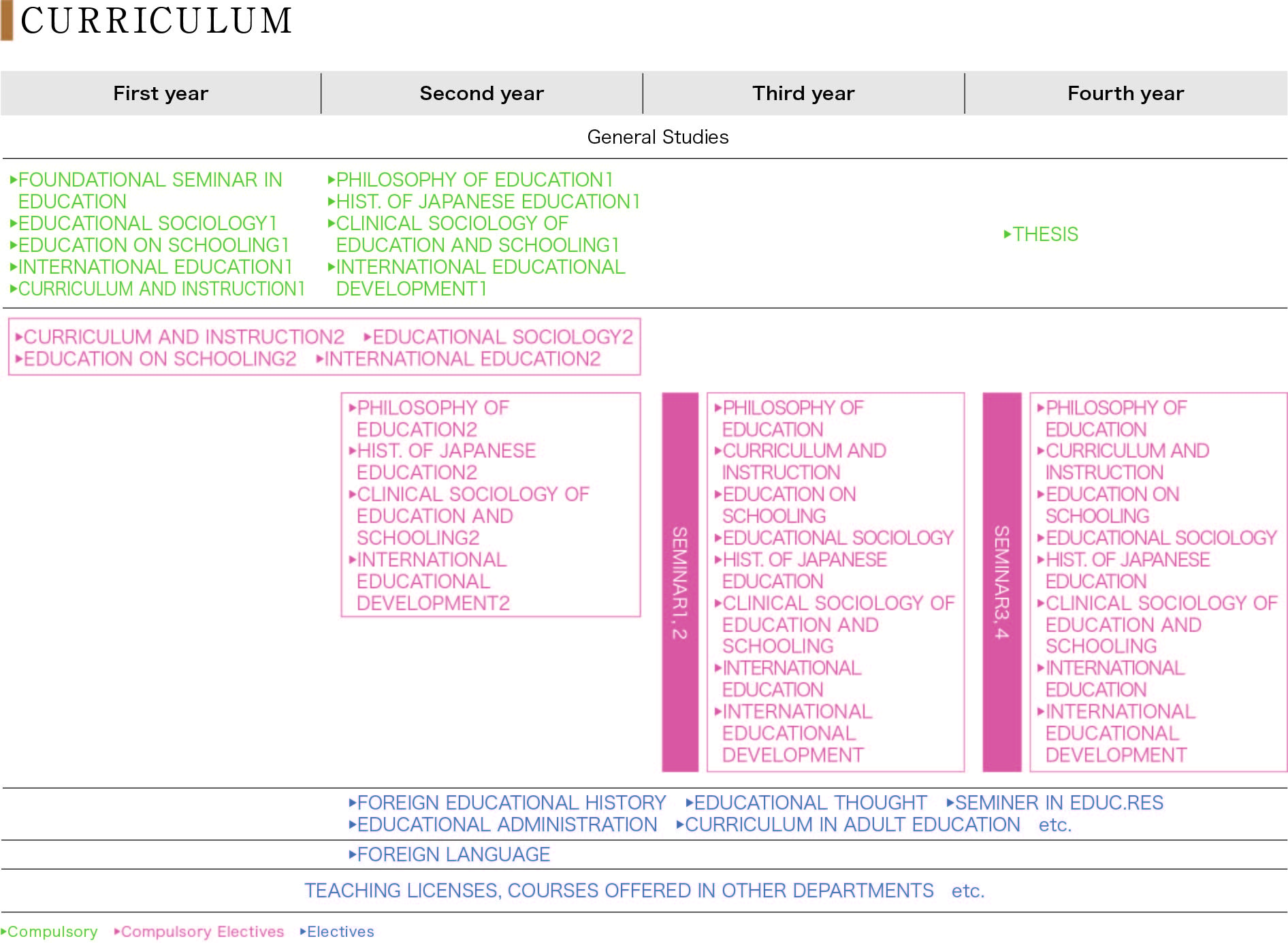Department of Education


Department Features
The course comprehensively and multilaterally examines various issues surrounding people and education from a pedagogical perspective, deepening students’ thinking and understanding of human dignity and cultivating knowledge and practical skills to deliver education that values human dignity.
To ensure learning that is smooth and high in quality, we have established three areas of specialization: basic, practical, and international. After building an academic foundation, the curriculum is designed to enable students to approach the basic, practical, and international issues surrounding education today with confidence. The program also trains teachers and researchers who value human dignity and who excel in their humanity and expertise, as well as those who are independent and pedagogically literate enough to play an active role in the international community.
The Department of Education offers a degree program with the SPSF (Sophia Program for Sustainable Futures) and instruction in English.
Q&A
-
A: Of course, this is a department where those who wish to become teachers can learn deeply about the fundamental issues of education, but it is not a department whose exclusive purpose is to train teachers. Rather, it is a department where students can learn about various problems, issues, and strategies for nurturing and developing people, and build a foundation for becoming people who can play active roles in various facets of society.
-
A: If you register for the teaching and curatorial programs and obtain the necessary credits, you can receive a junior high school teacher’s (social studies) or high school teacher’s (geography, history, and civics) license and a curator’s license.
Curriculum
In the first and second years, students study subjects (philosophy of education, history of Japanese education, sociology of education, educational methodology, school pedagogy, clinical sociology for school, international education, and international educational development) that form the foundation of basic, practical, and international studies, The will also gain the knowledge necessary to approach various social issues centering on education. From the third year, each student selects a field of interest and pursues specialized study under the guidance of faculty members in seminars, and in the fourth year, students conduct research and write a graduation thesis. The program features an environment in which students can study a wide range of subjects according to their interests, with numerous elective courses ranging from lectures to seminars.
as of 2022
* Please refer to the syllabus for more information on the courses.
Course Examples
- Philosophy of Education
While learning about major educational thought, mainly from the West, we will consider what it means to take a philosophical view of the concept of education. From there, students will develop the ability to consider contemporary educational issues from a principled perspective.
- History of Japanese Education
This program traces the historical development of education in Japan since the early modern period, from multiple perspectives, including institutions, policies, ideologies, and practices. Students will also acquire the ability to understand the social and historical context in which contemporary educational issues and problems arise.
- Curriculum and Instruction
In Curriculum and Instruction, students gain an understanding of the basic skills related to structuring and organizing a curriculum (Curriculum),and the principles of learning, and methods and techniques of putting those principles into practice based on them (instruction).
- Educational Sociology
While studying the fundamentals of sociology, we will consider the relationship between Japanese society and education/schools. We will also explore the impact of recent changes such as technological development and globalization.
- Education on Schooling
We will examine the issues of school education and explore the nature of education from multiple perspectives, including ideology, history, practice, and policy. We will also examine the theoretical and practical issues of citizenship education, which has been the focus of much attention.
- International Education
We will organize and examine the impact of inter-state and inter-regional relations on education, and conversely, the impact of education on the nation and the region, from the perspectives of history, policy, culture, and multiculturalism, in order to deepen our understanding of the role of education.
- Clinical Sociology of Education and Schooling
Students will learn how to conduct surveys and research various problems in the field of education, such as bullying, truancy, delinquency, deviance, academic achievement gaps, and teacher-student relationships while understanding the need for a clinical approach to the sociology of education.
- International Educational Development
The course will consider how to identify and solve problems related to education policy, practice, and administration in developing countries, and the role of the international community in doing so. This course will deal with not only school education but also literacy and non-formal education, and students will be able to gain an understanding of education in conflict areas.
- Comparative Education
Comparative Education is a field that applies historical, philosophical, and social science theories and methods to international issues in education. By making valid comparisons, we can understand our own educational traditions better. At Sophia University, we study comparative education from the perspective of integral human development for a more humane and hope-filled society.
Available Teaching Licenses and Subjects
- First Category Teaching license for Junior High School (Social Studies)
- First Category Teaching license for High School (History and Geography, Civics)
Curatorial courses are available.
Educational Objectives and Policies
-
To investigate various problems surrounding education and human existence using comprehensive, multi-faceted approaches grounded in the discipline of education studies, and to cultivate a capacity to realize education that values human dignity.
-
To train educators and researchers with outstanding expertise and human qualities founded on respect for human dignity, and to produce individuals with educational expertise and independence to play active roles internationally
-
The Department of Education sets standards for the skills and knowledge students should acquire before graduation as follows. Those who fulfill the graduation requirements shall be deemed to have acquired these qualities and will be awarded a diploma.
- The ability to acquire broad knowledge of pedagogical studies and associated studies, understand what it means to observe the various issues associated with humans and education in Japan and overseas from a pedagogical perspective, and to envision a rich and practical education that respects human dignity
- The ability to pedagogically interpret educational efforts made in schools, societies, households and companies in Japan and abroad and the phenomena and issues that occur in association with such efforts, using the knowledge and methodologies of philosophy, history, sociology and psychology as well as to comprehensively and multifacetedly pursue pathways to realize education with respect for human dignity and appropriately express one’s views.
- The ability to actively and friendlily collaborate with a diversity of other people to persistently engage in solving educational issues and achieving an education founded on human respect with an international perspective founded on human dignity and through incessant self-reflection
-
In accordance with the Diploma Policy, the Department of Education constructs its curriculum as follows:
- As with other departments of the Faculty of Human Sciences, the curriculum comprises university wide General Courses, Language Courses, and Departmental Courses (General Departmental Courses, Specialized Departmental Courses) with an aim to achieve a harmonized combination of broad cultural knowledge and profound expertise
- Courses are categorized into three areas in order to have students understand the various fields covered by the extensive discipline of education and systematically acquire the unique academic 21 features: “Basic Areas” (Educational Philosophy, History of Education in Japan, History of Education Overseas, Educational Sociology, Educational Administration, etc.); “Practical Areas” (School Education, Clinical Sociology of Education and Schooling, Educational Methodology, Lifelong Education, etc.); “International Areas” (International Education, Comparative Education, International Education Development, etc.). Some courses offered under “International Areas” will be taught in English.
- In the spring semester of the freshman year, students take the Introductory Seminar in Educational Science as a compulsory course to learn basic matters and skills necessary for pursuing undergraduate study. In the freshman and sophomore years, students take introductory courses as compulsory and elective compulsory courses to learn basic matters, perspectives and research methodology. In the spring semester of the junior year, students will chose a Seminar based on what they have learned as freshmen and sophomores and learn how to approach issues involving humans and education from various professional positions and acquire the required basics of thought, judgment and expressive skills. In the fall semester of the junior year, students will focus on their Seminars, where they will deepen their expertise, determine their individual research themes and engage in research, thus fostering the ability to interpret phenomena from an educational perspective and to seek pathways toward resolution, as well as an aspiration for human dignity and international perspectives. In the senior year, through compiling their thesis, students will comprehensively and multifacetedly pursue pathways to achieve education with respect for human dignity and become capable of presenting their views, as well as acquire the qualities and ability to persistently engage in solving problems through continued self-reflection.
- Students may systematically acquire pedagogy through three-dimensional learning comprising the three areas and take courses from a variety of associated course categories, including those offered by other faculties and departments in line with individual interests and concerns and future prospects. Also, many English-taught courses have been listed with consideration of nurturing fundamental capacities to acquire an international perspective.
- Creative learning methods have also been introduced to achieve more autonomous and dialoguebased learning. At lectures, students are required to complete reaction papers to which the instructor will provide comments at the following class or offer a summary of reactions based on which students will engage in further debate. Seminars will be centered on individual or group presentations and debates, but may also involve exchange with Seminars of other universities in and outside Japan or fieldwork in Japan and overseas. The final thesis defense will be open to other students and faculty, and is a forum to give a creative and effective presentation to a large audience.
- The individual progress and status of learning of each student will be evaluated by combining various evaluation criteria and methods, such as reaction papers and worksheets used in class, participation in and contribution to debates and group work, reports and exams given in mid-term.
- The Internship Course is added to the curriculum as an elective course to develop students’ abilities to envision a practical image of human-oriented education and persistently tackle issues from a 22 global perspective by collaborating with diverse people.
-
The Department of Education welcomes students who are interested in the various issues associated with humans and education and are capable of addressing them flexibly and multifacetedly. We seek inquisitive students with a broad interest in the international community and different cultures.
- We seek students who are interested in the various issues associated with humans and education and are eager to find solutions to them. We especially welcome inquisitive students with a broad interest in the international community and different cultures.
- The basic academic competence commonly required across all entrance exam types include the ability to think and present logically in Japanese and basic English communication skills. We seek students who can use these skills to openly express their own ideas and at the same time accept the ideas of others, flexibly come up with ideas and think multifacetedly.
- We welcome a diversity of students with different personalities and cultural backgrounds. Furthermore, in the Special Exams, we will admit students that bear an interest in and understanding of various current affair-level educational issues covered by newspaper and other media, as well as the basic competence to organize and present one’s own thoughts about them
Faculty Members
Shinichi AIZAWA Professor

Miki SUGIMURA Professor

Katsumi YUKAWA Professor
Maria MANZON Associate Professor

| Research Areas | Comparative education histories,parental involvement in education,religion and education |
|---|
